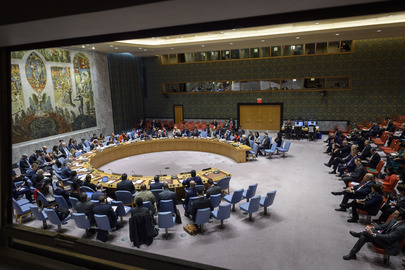Senior UN refugee agency (UNHCR) official in Sudan, Jacqueline Wilma Parlevliet, said there had been “significant outflow out of El Fasher into Tawila” – around 60 kilometres west of the city – which is already hosting around 650,000 displaced.
New arrivals have recounted stories of widespread ethnically and politically motivated killings, including reports of people with disabilities being executed because they were unable to flee, and others being shot as they tried to escape, said Ms. Parlevliet.
Humanitarian agencies on the ground in Tawila, including UNHCR, are responding as best they can, providing protection services, counselling, and cash assistance to affected communities.
Call for humanitarian corridors
However, the UNHCR official warned that the destruction of infrastructure across Darfur – markets, hospitals, schools, and homes – has left civilians with few resources.
In addition, reports have emerged of “massive killings” in the city of Barah, located in the central Kordofan region, where the RSF recently seized control and carried out similar acts of violence, reported UNHCR.
“We need peace, we need a ceasefire, we need humanitarian corridors,” Ms. Parlevliet said, emphasising that many civilians left in El Fasher remain unable to flee, with many of them being “too weak” and the ongoing situation being “too dangerous” for them to move.
IOM demands protection of civilians
The UN migration agency, IOM, urged all sides in Sudan’s conflict to protect civilians in El Fasher and allow “immediate, safe, and unhindered” humanitarian access.
“In just two days, more than 26,000 people have been forced to flee the city,” said IOM chief Amy Pope, warning that “scenes emerging from El Fasher are horrific.” Families are walking for days “under the scorching sun…with no food, no shelter, no medicine.”
IOM said it is rushing tents and emergency shelter kits to Tawila but warned that “needs are rising faster than aid can reach people.” Pope urged the world to “act now to end the suffering.”
‘Trapped, starving, terrified’
For the last 18 months, El Fasher has become the “epicentre of suffering”, with hundreds of thousands of civilians trapped under an increasingly tight siege by the RSF, said UN Secretary-General António Guterres in a statement issued following the announcement of the withdrawal of Government forces from the city on Thursday.
News reports citing satellite imagery suggested that mass atrocities have already been carried out, showing bodies piled up following large-scale executions and house-to-house clearances in El Fasher by RSF fighters.
The UN chief said civilians had been “trapped, starving, and terrified,” as he renewed his call for an immediate ceasefire between the rival military forces. Civil war erupted in April 2023.
Mr. Guterres strongly condemned the reports of violations and rights abuses, “including indiscriminate attacks and targeting of civilians and civilian infrastructure, as well as gender-based violence, ethnically motivated attacks and ill-treatment.”
He reiterated his call for an immediate end to the fighting and urged both the military government forces and RSF leadership to engage with his Personal Envoy towards a negotiated settlement.
Source of original article: United Nations (news.un.org). Photo credit: UN. The content of this article does not necessarily reflect the views or opinion of Global Diaspora News (www.globaldiasporanews.com).
To submit your press release: (https://www.globaldiasporanews.com/pr).
To advertise on Global Diaspora News: (www.globaldiasporanews.com/ads).
Sign up to Global Diaspora News newsletter (https://www.globaldiasporanews.com/newsletter/) to start receiving updates and opportunities directly in your email inbox for free.
































